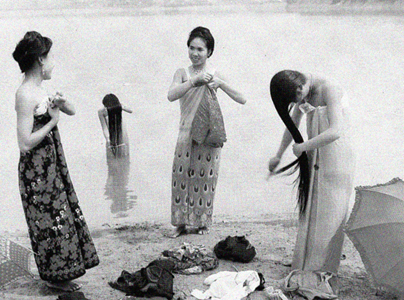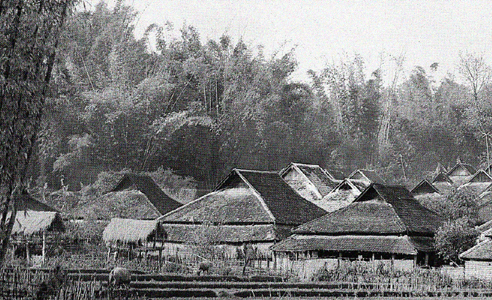Jinghong Part 1 (February 1991)
3 long and uncomfortable days to get there
In February 1991 our bus from Kunming pulled into the dilapidated bus station of Xishuangbanna’s capital Jinghong. It had taken 3 long and uncomfortable days to get there. The bus was old and worn out; its seats broken and on their last legs, with sharp metal edges digging painfully into our sore thighs. In spite of the length and discomfort of the journey, most passengers, a mix of gloomy backpackers and Chinese officials, seemed unwilling to engage in conversation and no spirit of group solidarity had sprung up among us; something that usually happened (and still does) on long trips in China.
The highlights of the journey
Only we and a gaggle of young Hong Kongers seemed to be enjoying the tropical scenery and the gradual rise of temperatures. The main relief was provided by the nightly stops in extremely basic, but surprisingly clean road-side hotels and the decent food along the way.
One of the highlights of the seemingly-endless journey was an early encounter with one of Xishuangbanna’s many minorities. It happened during a toilet stop near Simao, when a pair of shaven-headed Lahu girls, who were walking by the side of the road, started screaming and pelted for cover in the jungle as soon as they saw Margie and I disembark. And we hadn’t even started peeing…
Grabbing the last cheap room
On arrival, we had the satisfaction of beating our unsociable fellow travellers to the reception desk of the Xishuangbanna Binguan (or Banna Binguan) where we managed to grab the last cheap room in the old wing and settled down to a cold beer and a shower of the same temperature.
The Banna hotel was one of China’s few hotels with a bit of character and ambience
In those days, the Banna hotel was one of China’s few hotels with a bit of character and ambience.
The rooms were large with wooden furniture and huge windows with French shutters. Slowly swishing fans and tatty mosquito nets completed the almost-colonial picture. Outside, the central courtyard was full of big, shady palm trees and colourful plants. The warm, sunny weather, in stark contrast to the rest of China in February, put the icing on the cake.
Whiffy Toilets
The rest of the hotel, the staff, toilets and maintenance were pure China 1990: service was brisk and abrupt, with cleaners barging into your room unannounced at the most ungodly hours and sweeping the floors while you were still in bed; toilets were decidedly whiffy. However, it was one of those hotels that we have never forgotten and it still stirs pleasant memories until this day.
an overgrown village
In 1991, Jinghong gave the impression of an overgrown village. A few streets of squat concrete structures, mostly hidden by giant palms, near the Banna hotel and by the Mekong River, were the only signs of Han Chinese influence. However, concrete China soon gave way to the large wooden and stilted houses of the local Dai minority whose villages and green rice paddies started a mere stone’s throw away from the centre. The overall ambience of Jinghong was that of a slow motion movie: nothing moved quickly, including transport or services.
Amazing Dai Food
Yet, the local Dai weren’t so slow in other aspects: a number of Dai entrepreneurs had already cottoned on to the potential of tourism and opened up their houses as restaurants and guesthouses. Manting Lu was the beginning of this Dai area and the entrance to Manjing Lan Village. Restaurants like the Dai Minority Guest House and adjacent buildings served great local food: delicious grilled chicken and fish, fried eels, tasty dished made of aubergines, bamboo or different kinds of fungus, often accompanied by a fantastic peanut sauce.
Unfazed locals
We had a pretty good week exploring the countryside, cycling through Dai villages and frequently getting lost. In general the Dai seemed unfazed by the presence of Westerners, poking their noses around their villages and houses. Quite remarkable given that this area had only opened up to the world less than a decade earlier.
local boat down the Mekong to the small town of Menghan
One day we took a local boat down the Mekong to the small town of Menghan (there wasn’t a road) for the weekly market. On another occasion, we spent a fantastic day temple hopping and minority spotting in Damenglong and around. In those days the local Bulang, Lahu and Hani ladies working in the fields, dressed in full ethnic regalia, would often scream and run for cover as soon as they saw us. The cool Dai ladies, on the other hand, would smile and try to orientate us in the right direction as we stumbled into irrigation ditches and scrambled across rickety bamboo bridges not built for clumsy and heavy Western bodies. The men were hardly ever to be seen in the fields, but would be found in the villages, smoking and drinking tea -or something stronger.
lack of real jungle and unspoilt wilderness
If there was something lacking on our first visit to Xishuangbanna, it was probably the lack of real jungle and unspoilt wilderness. Even then, huge swathes of virgin tropical rainforest had already been cut down, to be replaced by extensive rubber plantations. I remember looking out of the bus window on the way to Damenglong at the barren hills and orderly lines of rubber trees and feeling depressed.
swathes of virgin tropical rainforest had already been cut down
The clearing of the tropical rain forests of Xishuangbanna is a trend that has continued unabated to this day. The consequences for the local Dai farmers have now become so serious that locals and police have clashed several times in recent years with reported deaths.
In part two next week we will look at Jinghong 2008


